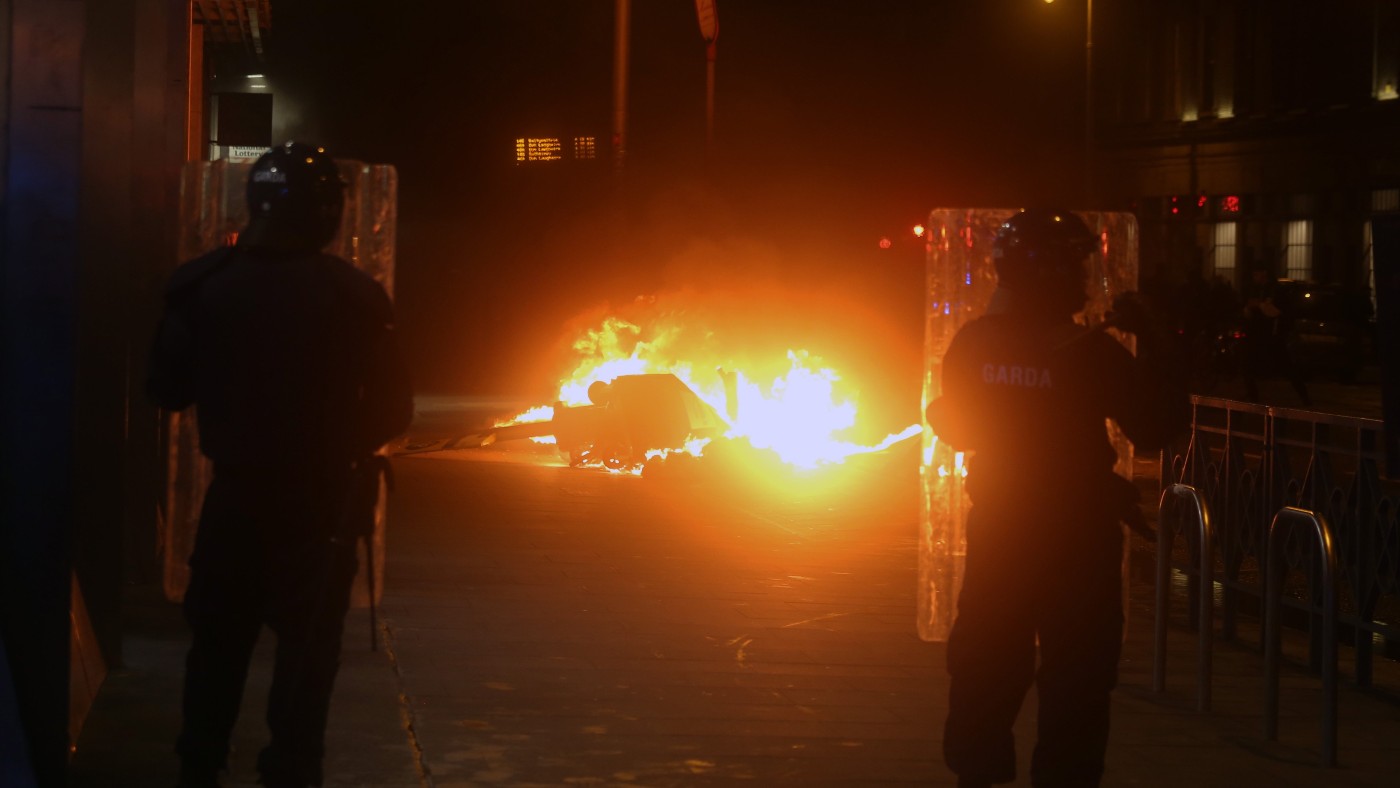Dublin riots: a blow to Ireland’s reputation
Unrest shines a spotlight on Ireland's experience of mass migration

A free daily email with the biggest news stories of the day – and the best features from TheWeek.com
You are now subscribed
Your newsletter sign-up was successful
Ireland had long seemed resistant to the growing anti-immigrant sentiment seen across Europe, said Rory Carroll and Lisa O'Carroll in The Guardian.
Today, one-fifth of the Republic's population of five million was born elsewhere – a "seismic" but largely painless transformation that has occurred since the 1990s. Thanks in part to its own long history of emigration, Ireland prided itself on greeting foreigners with céad míle fáilte – a "hundred thousand welcomes".
But that seems to have changed. Last Thursday, a naturalised Irish citizen of Algerian origin stabbed three children and a woman outside a school in central Dublin, and within hours, "all hell had broken loose". Anti-immigrant protesters gathered, chanting xenophobic slogans: "Get them out", "Enough is enough". The worst riots in Dublin's recent history followed. Nearly 50 people were arrested, and dozens injured. Three buses and 11 police cars were set on fire. The events "scorched the notion of some progressive Celtic nirvana".
The Week
Escape your echo chamber. Get the facts behind the news, plus analysis from multiple perspectives.

Sign up for The Week's Free Newsletters
From our morning news briefing to a weekly Good News Newsletter, get the best of The Week delivered directly to your inbox.
From our morning news briefing to a weekly Good News Newsletter, get the best of The Week delivered directly to your inbox.
'A pressure valve for discontent'
That idea has long been a liberal delusion, said Tim Stanley in The Daily Telegraph. A recent poll found that 75% of Irish people think there are "too many" newcomers. Protests against centres for asylum seekers happen almost weekly, and placards bearing slogans such as "Ireland is full" are widely seen; the arrival of about 100,000 Ukrainians has added to tensions. Despite the "sense of moral superiority" among its elite, Ireland's experience of mass migration has been very similar to Britain's, but without parties such as UKIP acting as "a pressure valve for discontent".
This isn't just about migration, said Ian O'Doherty in The Spectator. The area where the trouble started – Dublin's north inner city – has long been seen as "bandit country", known for its drug dealing and feuding gangs. It has spent the past few years in a "cycle of decay and despair"; lockdown and austerity have helped to make it "a powder keg".
'They do not speak for us'
This riot is not "an expression of where Ireland is or who we are", said Fintan O'Toole in The Irish Times. Yes, there are tensions as the country struggles to cope with refugees amid a housing crisis, but that doesn't mean that anti-migrant sentiment is seething across the nation (there has been much praise for the Brazilian immigrant who stopped last week's stabbings).
And yes, there are problems in north Dublin, but it's very unfair to blame its community for last week's events. The rioting was organised by a tiny gang of far-right "fascists", aided by a few hooligans. "These pitiful thugs are not us. They do not act for us, speak for us or burn buses for us."
A free daily email with the biggest news stories of the day – and the best features from TheWeek.com
-
 Switzerland could vote to cap its population
Switzerland could vote to cap its populationUnder the Radar Swiss People’s Party proposes referendum on radical anti-immigration measure to limit residents to 10 million
-
 Political cartoons for February 15
Political cartoons for February 15Cartoons Sunday's political cartoons include political ventriloquism, Europe in the middle, and more
-
 The broken water companies failing England and Wales
The broken water companies failing England and WalesExplainer With rising bills, deteriorating river health and a lack of investment, regulators face an uphill battle to stabilise the industry
-
 Switzerland could vote to cap its population
Switzerland could vote to cap its populationUnder the Radar Swiss People’s Party proposes referendum on radical anti-immigration measure to limit residents to 10 million
-
 The fall of the generals: China’s military purge
The fall of the generals: China’s military purgeIn the Spotlight Xi Jinping’s extraordinary removal of senior general proves that no-one is safe from anti-corruption drive that has investigated millions
-
 Epstein files topple law CEO, roil UK government
Epstein files topple law CEO, roil UK governmentSpeed Read Peter Mandelson, Britain’s former ambassador to the US, is caught up in the scandal
-
 Iran and US prepare to meet after skirmishes
Iran and US prepare to meet after skirmishesSpeed Read The incident comes amid heightened tensions in the Middle East
-
 Syria’s Kurds: abandoned by their US ally
Syria’s Kurds: abandoned by their US allyTalking Point Ahmed al-Sharaa’s lightning offensive against Syrian Kurdistan belies his promise to respect the country’s ethnic minorities
-
 Israel retrieves final hostage’s body from Gaza
Israel retrieves final hostage’s body from GazaSpeed Read The 24-year-old police officer was killed during the initial Hamas attack
-
 China’s Xi targets top general in growing purge
China’s Xi targets top general in growing purgeSpeed Read Zhang Youxia is being investigated over ‘grave violations’ of the law
-
 Panama and Canada are negotiating over a crucial copper mine
Panama and Canada are negotiating over a crucial copper mineIn the Spotlight Panama is set to make a final decision on the mine this summer